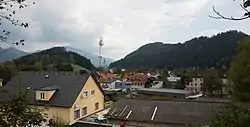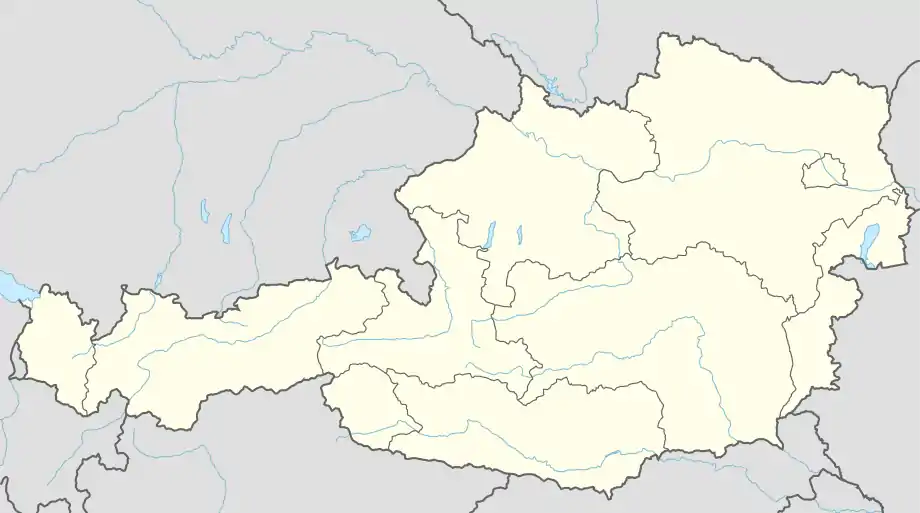Thörl
Thörl is a market town at the foot of the Hochschwab in the Styrian district of Bruck-Mürzzuschlag.
Thörl | |
|---|---|
 | |
 Coat of arms | |
.png.webp) Location within Bruck-Mürzzuschlag district | |
 Thörl Location within Austria | |
| Coordinates: 47°31′01″N 15°13′09″E | |
| Country | Austria |
| State | Styria |
| District | Bruck-Mürzzuschlag |
| Government | |
| • Mayor | Günther Wagner (SPÖ) |
| Area | |
| • Total | 166.43 km2 (64.26 sq mi) |
| Elevation | 638 m (2,093 ft) |
| Population (2018-01-01)[2] | |
| • Total | 2,295 |
| • Density | 14/km2 (36/sq mi) |
| Time zone | UTC+1 (CET) |
| • Summer (DST) | UTC+2 (CEST) |
| Postal code | 8621 |
| Area code | 03861 |
| Vehicle registration | BM |
| Website | www.thoerl.gv.at |
Geography
Boroughs
Thörl has eight boroughs: Etmißl, Fölz, Hinterberg, Lonschitz, Oisching, Palbersdorf, St. Ilgen, and Thörl.
Neighboring Communes
- in the north: Mariazell
- in the east: Turnau and Aflenz
- in the south: Kapfenberg
- in the southwest and west: Tragöß-Sankt Katharein
- in the northwest: Wildalpen
History
As of 1 January 2015 the formerly independent municipalities Sankt Ilgen and Etmißl were incorporated into Thörl. Already in 1955 the municipality Fölz bei Thörl had become part of the municipality.
Politics
Thörl's mayor is Günther Wagner of the SPÖ. In its municipal council (15 seats) the party seats are distributed as follows: 9 SPÖ, 3 ÖVP, 2 Freie Unabhängige Liste - Lebenswert, 1 FPÖ.[3]
Traffic
Streets
The Mariazeller Straße is the most important road link between Kapfenberg and Mariazell, the most popular pilgrimage site in Austria. In its further course it leads to Sankt Pölten, the capital of the neighbouring state of Lower Austria.
Railway (History)
In 1893, the Thörlerbahn, a narrow gauge railway with a track gauge of 760 mm, which linked the area with Kapfenberg and the Austrian Southern Railway (Südbahn), was opened. In particular, the local iron industry benefited from this. A connection to the Austrian Western Railway was planned, but never realized.
In 1959, the passenger traffic was terminated. However, in 1991, the Verein Thörlerbahn (Thörlerbahn Association) took out a trial run with a nostalgic train. But when a bank failure bankrupted the local iron industry, the operator of the railway, Steiermärkische Landesbahnen, lost their largest (and actually the only) freight customer. As a consequence of that, they had to close the track.
In 2003 and 2004, the train tracks were removed and replaced by a cycle track.
References
- "Dauersiedlungsraum der Gemeinden Politischen Bezirke und Bundesländer - Gebietsstand 1.1.2018". Statistics Austria. Retrieved 10 March 2019.
- "Einwohnerzahl 1.1.2018 nach Gemeinden mit Status, Gebietsstand 1.1.2018". Statistics Austria. Retrieved 9 March 2019.
- Municipal council mandates